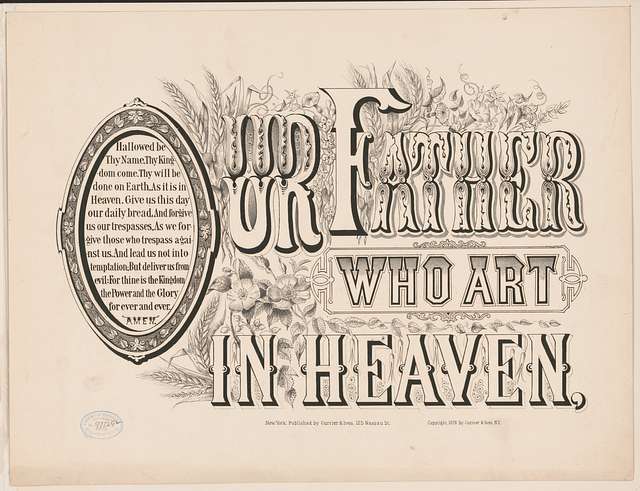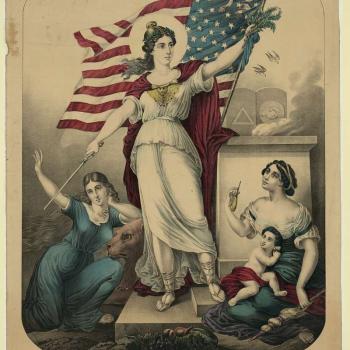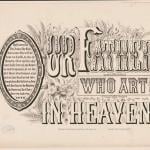[While I’m in Ecuador, I’m posting columns and articles that I wrote in the early 2000’s for Tabletalk Magazine, which kindly gave me permission to do this. We’ll revert to our usual format of Monday Miscellanies and Friday discussions when I get back, hopefully next week.]
This column is a little dated, because it alludes to the interfaith worship controversies that roiled our denomination after the 9/11 attacks. Also because today saying “our thoughts and prayers are with you” has become controversial.
But what this column is mostly about is the connection between prayer and naming the God to whom we pray.
Prayer and Culture
I recently headed the translation committee for our church body’s new hymnal and worship book. Our previous hymnal included the choice of a modernized version of the Lord’s Prayer. We found, though, that no one used it.
Even the churches that had given themselves over to contemporary worship—claiming that old-fashioned language and time-honored practices were incomprehensible to “modern” or “postmodern” people today—when they deigned to pray the Lord’s Prayer used the old-fashioned, time-honored version, complete with “thy’s,” “art’s,” and “trespasses.”
The Lord’s Prayer is the ultimate prayer, comprehending everything that we can pray for, and as such it sinks deep into the consciousness and into the culture.
In our culture today, religion is treated as something “obscene”; that is, like “bodily function” words used to be, referring to realities that are socially accepted only as long as they are not mentioned and kept out of sight. Strangely, though, prayer still has cultural currency.
A TV reporter might be a militantly biased leftwing secularist, but after an interview with the survivors of a hurricane or the family of a murder victim, he often tells them, “our thoughts and prayers are with you.” Legislatures, including those that acknowledge no laws higher than the ones they make up, still begin with prayer., When a national catastrophe takes place—for example, the 9/11 attacks—presidents declare a day of prayer and mass prayer services are convened in sports stadiums or the National Cathedral.
At these exercises of national piety, the Lord’s Prayer is no longer used. Whereas some of us can remember beginning each school day with the Flag Salute and the Lord’s Prayer, it is generally recognized that use of a specifically Christian prayer is not appropriate in a religiously pluralistic context. In our new civil religion, not just Christians but Muslims, Jews, Buddhists, Sikhs, Hindus, Native American animists, and whatever other religions might be represented in the community, must be dragged out and acknowledged. Sometimes this means each priest, imam, or witchdoctor offering their own distinct prayers, as the assembly bows their heads. Sometimes the assembled but diverse worshippers offer generic prayers that refer to no specific deity.
But the Lord’s Prayer reminds us that it makes a huge difference whom we are praying to. A prayer calls upon a specific God, one who is named. “Our Father, which art in Heaven, hallowed be thy name.” The teaching of the Bible about prayer is full of names. Jesus tells us to pray in His name and to hallow the name of the Father. The Holy Spirit is said to pray with us. The point is, for Christians, prayer is Trinitarian. We do not pray to a generic deity, much less to the presiding god of a pantheon. We are praying to Someone specific, the Triune God revealed in the Bible, and to Him alone.
Even some Christian churches—or, perhaps, used-to-be- Christian churches—are now cringing at invoking “The Father, Son, and Holy Spirit” and are balking at addressing God as “our Father.” Those are sexist terms, so they say. They address God as if He were a male. Since God is spirit, they maintain, we should use language that is not gender-specific, so as not to exclude women from identifying with the divine. So the persons of the trinity become “Creator, Redeemer, and Sanctifier.” Or, as recommended by a liberal Presbyterian task force, “Rock, Redeemer and Friend,” “Mother, Child and Womb,” “Rainbow, Ark, and Dove,” or “Sun, Light and Burning Ray.”
But praying to “Burning Ray” is not the same as praying to “Our Father, which art in Heaven.” Christianity is a revealed religion. God’s Word, indeed God incarnate, reveals the words with which we are to address and think of Him. If we make up our own religious language according to our preferences and sensitivities, we are out of the orbit of Christianity. And the deity that we name “Burning Ray,” being our own creation, is an idol. And as if that were not bad enough, we are repudiating not just the first but the second petition of the Lord’s Prayer: “Hallowed be thy name.”
Our culture’s new civil religion is inclusive of everyone, but it cannot be inclusive of Christians. When it comes to interfaith worship services, multi-faith prayer meetings, and civic demonstrations of our religious tolerance, Christians must politely excuse themselves.
On days of national prayer, it is a pious act of good citizenship for citizens of every religion to go to their mosques, synagogues, ashrams, or churches to make supplications to whatever gods they believe in to bless this country. To summon them all to do so in one place of worship, though, is not toleration of religion; rather, this shows disrespect for everyone’s religious integrity.
Christians know that it is wrong to mistreat people of other religions and that faith is not something that can be forced on unbelievers. So Christians should be tolerant. But religious toleration has morphed into religious relativism, the notion that all religions are equally valid. Christians cannot be relativists, but a culture that respects religious diversity can have a place for Christians in all their uniqueness. But now diversity is morphing into what can only be described as polytheism, the cultural need to affirm many gods.
This is where Christians must draw the line, even if it means exclusion from the public square. After all, Christians suffered martyrdom in polytheistic Rome rather than offer the slightest ritualistic prayer to a deity other than “Our Father, which art in Heaven.”
Illustration: Our father who art in heaven by Currier & Ives (1876) via Picryl, Public Domain













